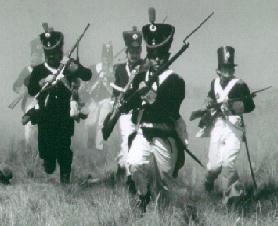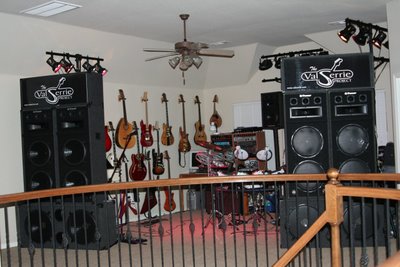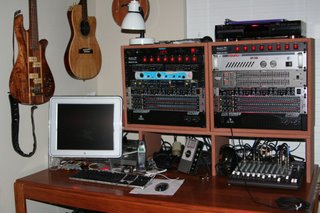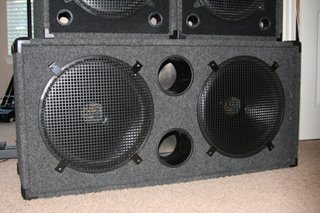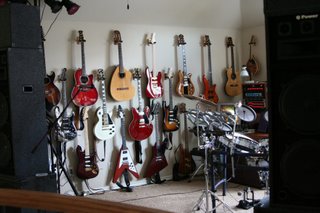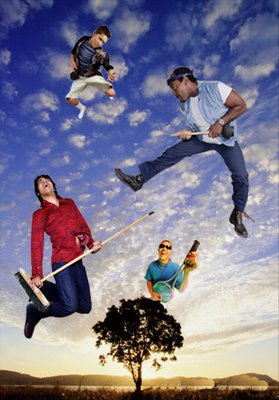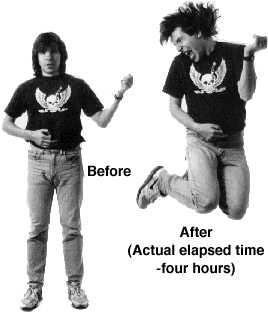Jay Greenberg - Boy Genius

Here is an article about a musical child prodigy named "Blue Jay" Jay Greenberg. At 12, he had written 5 major symphonies, and some compare him to Mozart and others say that his level of musical genius has not been seen in perhaps 200 years.
http://www.cbsnews.com/stories/2004/11/24/60minutes/main657713.shtml
While reading the story I noted that he said that he hears the whole musical piece intact in his head and then he works it out on paper. That really resonated with me because it has always been that way with me too. I know exactly what he means. And when he says he likes to walk while composing in his head because he can walk in time with the music - again - I have done that since I was very young.
Don't get me wrong, I am not saying that my talent is equal to this rare genius here, I am certain that his talent is stronger than mine, otherwise he would not be famous and be attracting this much attention.
But nevertheless, degree of talent aside, there are a lot of similarities I found in terms of process and methods and how the music just comes all in a piece intact, etc. His description of the internal processes are identical to what happens inside me. A big difference though is that his parents encouraged him to pursue music and sent him to Jullliard and they have developed his talent.
In my case, my parents felt that musicians are merely street beggars with an instrument. Needless to say, they did
I imagine there are many more people that could achieve similar things to Jay if we are encouraged at a young age and given the opportunities to develop the skills to go along with it.
One other comment I would make is that when I see child prodigies like this, it is a combination of extraordinary skill AND experience. Jay knew what a cello was and asked for it at 2 years of age. And he had never seen one or been exposed to the idea yet. But he knew. And when they took him to a music store to let him try it, he immediately sat down and began to play it.
I once saw a special about a young boy who played piano beautifully and had an instant repertoire of hundreds of songs stretching back about 50 years. He was 5 at the time, I think.
To me, this is further evidence supporting the concept of reincarnation. The idea that these kids had lived before and had been musicians in their prior life and had brought those skills and that repertoire along into this life seems plausible. Certainly more plausible than the notion that they would suddenly know how to play 300 songs from the previous 50 years on a piano with no training and no exposure to the songs whatsoever - not even once. There is simply no other logical physical mechanism to explain the abilities and the knowledge. Even the concept of cellular knowledge would require that the biological parents would have had these abilities in THEIR cells in order to pass them on to their offspring - which is not the case.
These gifted kids, like us, are not necessarily bringing conscious memories from a past life into the present life, but rather music is something that sometimes is pushed deeper than conscious memory - into the subconscious. That's why people can play on automatic pilot sometimes - without thinking about it. I am suggesting that these are the memories that may be surviving. This is consistent with those who talk about reincarnation that say that our subconscious survives although our conscious mind does not. In fact, when a therapist does research on past-lives, they hypnotize the subject, which puts the conscious mind to sleep so that they can speak directly to the subconscious. This is because that is where the memories of the past lives are. That is what survives from life to life across the multiple incarnations. At least, this is how it is described by the experts in that field.
But there is also another element I wanted to talk about with this.
Still to this day, I hear music in my head. Every day. All day, mostly. If I didn't push it out to focus on work and other things, it would play LOUD and constant in my head without stopping. Even in my sleep. I wake up clicking my teeth as drums (including the fills) to the music I am hearing. This has always been this way since as early as I can remember.
So I find that I really don't like external noise. Because that interferes and makes a really noise-polluted mess in my head. I don't watch TV very much at all anymore, and so when I hear it on in the next room while I'm working, it's very distracting. The sheer noise and blaring of it is more than annoying. It seems a frantic, high-energy blatant mind-numbing tool of retail commerce. It is over-the-top in every possible way.
Now I know what my mother meant when she used to say that "It's so noisy I can't hear myself think!!!" Now I know. I can't function properly in that kind of noise. I need to have quiet outside my head so I can clearly hear all the stuff going on inside.
Also, from a visual aspect, I can just sit here in silence and 'see' all kinds of images. One after another in quick succession. Some a fraction of a second, some paused for several seconds. That's how my mind is at all times. Most of the time, there is music playing, plus the stream of images.
So when I hear the TV blaring away in the next room, it is conjuring up images to synchronize with the sounds, and that intereferes with both the music in my head, and the images, AND the thoughts as I try to assemble them to write properly. The confusion gets to the point where I cannot even complete a sentence. I cannot articulate any thoughts because everything is so messed up.
Loud sudden noises bother me MUCH more than most people. When I am sitting in the stadium seats watching my daughter's high school band play, there are noisey excited people right behind me who will whistle or scream loudly and it jolts me, jars me, and makes me wince in pain. Like an electric shock to my system.
I am very sensitive to sound.
I have a problem with our little schnauzer. He is a great, well-behaved dog. He does what he is told, and is very playful and good-natured. However, when the doorbell rings he goes nuts. I mean he goes stark-raving INSANE! He leaps into the air, charges at the door and barks like the house is on fire. It frightens whoever is there because he sounds like a big dog that is going to take their head off. It is incredibly, surprisingly LOUD and abrasive, far louder than anyone would think a small dog is capable of, and it jars my nerves and makes me wince and shudder every single time. When people are in the house and they see how he responds when someone else comes to the door they are shocked. They can't believe that volume of sound comes out of a 30 lb little dog. The strange thing about my dog is that he is normally very quiet. Most of the time he is silent, and well behaved - even when he wants to play. It's just the doorbell that makes him explode. The other day, I had a party at my place and my boss, who is also a friend, came over before anyone else. The doorbell rang, the dog went nuts, and she and her little girl both jumped. She looked at me and said, "Oh My God Val!!! There is something seriously wrong with that dog! That's just crazy! He needs to be looked at. That is NOT normal!!"
For my part, I probably look ridiculous because when it happens, it so shocks my system, that I often drop things I am holding, or I might sometimes spill a drink or whatever. I instinctively shut my eyes tight, wince really hard, and all the muscles in my body contract and shake as if 10,000 volts of electricity was just shot through me. In fact, I guess you could relate it to an electric shock for me. That's what it feels like. Other people are surprised, but they don't have quite the same response as I do. I guess they are not as sensitive to sounds as I am. Obviously, anything I was working on is gone for the moment and it may take some time to get back to it.
The other thing I notice is that when I am alone and quiet and deeply concentrating on something, I hate to be interrupted. Okay, that's not strong enough. I mean I really REALLY HATE to be interrupted. It throws me out of a train of thought that I might have spent 45 minutes getting deep down into. Then I have to start all over.
When people do interrupt me like that, I wonder "Do other people not think deep like this? Is that why they don't understand how unnerving and shattering it is to be pulled out of a long train of thought like that?" Or is it that they think through this 45 minute train of thought in a few seconds and so it's nothing to them? Somehow that seems less likely.
This led me to thinking about the current teenagers. My daughter can't study UNLESS she has two or three things going on at the same time. She has the TV going in the corner, plus her IM buddies on her laptop, plus her music playing - sometimes a boombox, but usually her iPOD, AND she's doing her homework. And she can actually function like that!
In fact, she says that if she isn't inundated with a constant wash of sound and images, she can't focus. And she says her friends are the same.
I find this bizarre.



